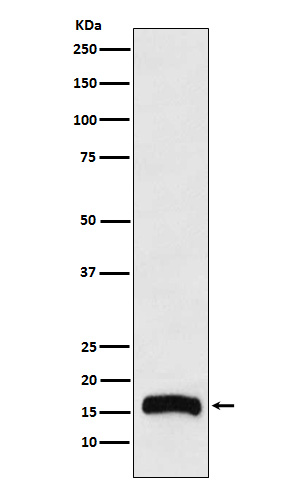
| WB | 1/1000-1/2000 | Human,Mouse,Rat |
| IF | 咨询技术 | Human,Mouse,Rat |
| IHC | 咨询技术 | Human,Mouse,Rat |
| ICC | 技术咨询 | Human,Mouse,Rat |
| FCM | 咨询技术 | Human,Mouse,Rat |
| Elisa | 咨询技术 | Human,Mouse,Rat |
| Aliases | ALOX 5AP; ALOX5 AP; ALOX5AP; FLAP;;FLAP |
| WB Predicted band size | Calculated MW: 18 kDa ; Observed MW: 16 kDa |
| Host/Isotype | Rabbit IgG |
| Antibody Type | Primary antibody |
| Storage | Store at 4°C short term. Aliquot and store at -20°C long term. Avoid freeze/thaw cycles. |
| Species Reactivity | Human |
| Immunogen | A synthesized peptide derived from human FLAP |
| Formulation | Purified antibody in PBS with 0.05% sodium azide,0.05% BSA and 50% glycerol. |
+ +
以下是关于FLAP(5-脂氧合酶激活蛋白)抗体的3篇代表性文献摘要概括:
---
1. **文献名称**:*Cloning of the cDNA for human 5-lipoxygenase-activating protein (FLAP)*
**作者**:Dixon, R.A. et al.
**摘要**:该研究首次克隆并鉴定了人类FLAP基因,揭示了其作为5-脂氧合酶(5-LO)关键辅助蛋白的功能,证明FLAP是白三烯生物合成的必要调节因子,为后续炎症和哮喘相关药物靶点研究奠定基础。
2. **文献名称**:*Pharmacological characterization of a novel FLAP inhibitor, MK-591*
**作者**:Evans, J.F. et al.
**摘要**:报道了FLAP抑制剂MK-591的开发,通过抑制FLAP与5-LO的相互作用阻断白三烯生成,在动物模型中显著减轻炎症反应,并进入早期临床试验用于哮喘和动脉粥样硬化治疗。
3. **文献名称**:*Association of FLAP gene polymorphisms with myocardial infarction*
**作者**:Helgadottir, A. et al.
**摘要**:通过全基因组关联分析,发现FLAP基因(ALOX5AP)特定单核苷酸多态性(SNPs)与心肌梗死风险显著相关,提示FLAP在心血管疾病炎症通路中的潜在作用。
---
以上文献涵盖FLAP的分子机制、抑制剂开发及疾病关联研究,可供快速参考。如需具体期刊信息或扩展,可进一步检索PubMed或SciFinder数据库。
×